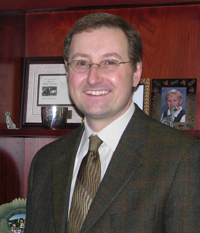 |
Chris Kratochvil, M.D. |
NOTE: This profile is part of a series highlighting the 26 researchers who were named UNMC Distinguished Scientists or New Investigators for 2007. Each of these researchers will be profiled in UNMC Today leading up to a March 20 ceremony to recognize their achievements.
- Name: Chris Kratochvil, M.D.
- Title: Child and adolescent psychiatrist and associate professor of psychiatry
- Joined UNMC: 1999
- Hometown: Savannah, Mo.
Briefly describe your research in laymen terms, please.
Our research group studies treatments for children and adolescents with mental illness. We focus primarily on pharmacotherapies, both alone and in combination with psychotherapy.
What led you to pursue this area of research?
During college, I worked summers as a recreation therapist at a state psychiatric hospital for children in Missouri, and later as a psychiatric technician at St. Joseph Center for Mental Health. I loved working with kids and developed a great passion for working with mentally ill children.
How do you see your research contributing to science?
One of the things I like most about our research is that our findings can make a direct impact on the treatment of children and adolescents with psychiatric disorders. We have helped to develop medications that are now widely used in pediatric and psychiatric clinics, and also have done work that has helped us to better understand the role of medication vs. medication combined with therapy.
Why did you become a scientist?
I am just about the last person I would have ever guessed would some day be called a “scientist,” but it just somehow evolved. I found a career that I love in child psychiatry, but it has a huge void in research regarding the efficacy of treatment. This meant the field was wide open to individuals with an interest. With that as a backdrop, I was exceptionally fortunate to have two wonderful mentors in Dr. John March at Duke and Dr. Bill Burke at UNMC who have helped me develop as a researcher, along with an extraordinary research team here at UNMC that makes it all happen.
What is your hope for the next generation of scientists?
In these days of tight budgets and limited grant dollars, I hope the opportunities I have had continue to remain available.
Beyond grant funding, how do you measure success?
I measure success by being able to help develop treatments that can make a real difference in the lives of children.
What would you tell a student interested in a research career?
As I mentioned above, I never dreamt I would become a researcher, but once I had the opportunity and tried it out I can’t imagine doing anything else. As a clinical researcher, I still have the opportunity to work with patients and their families as well as the ability to pursue research interests. I would recommend that if you have even the slightest interest, you owe it to yourself to take advantage of any opportunity you can to at least gain some experience in research.
Do you have a hero/role model? If so, what do you admire most about them?
No question, my wife is my greatest hero. She maintains a phenomenal balance as a busy pediatrician in the community, school volunteer, Girl Scout leader and mother of three. Her ability to maintain such a balance between family, patients and community is really wonderful to see and an inspiration to me.
Tell us about your family and hobbies outside of the lab.
My family is my favorite hobby. We have three children who are in third, fifth and eighth grade, respectively, and I like nothing more than to attend their school functions, watch them play sports and coach them in soccer.
List three things few people know about you.
- I was born in Pender, Neb.
- During college, I used to work as a juvenile probation officer for Sarpy County.
- In order to get experience in research while I was training at Duke, I responded to an ad for a research assistant in a prominent researcher’s lab, and then landed the job when I volunteered to work for free.